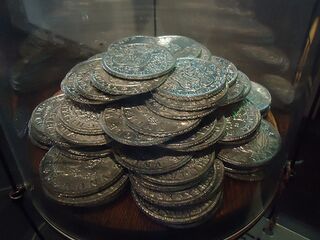Difference between revisions of "Spanish dollar"
(Created page with "right|thumb|320px|A pile of replica ''reales de a ocho'', on display at the Museum of the Chinese in America *''Other Names: Real de a ocho, piece o...") |
|||
| Line 5: | Line 5: | ||
They were first minted in [[1536]], and quickly became a global standard, because of their rather reliably standard weight and purity. Largely minted using silver from South American mines such as Potosi, Spanish coins traveled to East Asia in massive volumes aboard the [[Manila galleons|Acapulco-Manila galleons]]. They soon came to circulate even in China, especially in and around [[Guangzhou]]. By the 19th century Spanish dollars were widely circulating as-is in many parts of the region, rather than being melted down; this was especially the case in southern China. | They were first minted in [[1536]], and quickly became a global standard, because of their rather reliably standard weight and purity. Largely minted using silver from South American mines such as Potosi, Spanish coins traveled to East Asia in massive volumes aboard the [[Manila galleons|Acapulco-Manila galleons]]. They soon came to circulate even in China, especially in and around [[Guangzhou]]. By the 19th century Spanish dollars were widely circulating as-is in many parts of the region, rather than being melted down; this was especially the case in southern China. | ||
| + | |||
| + | Some 350 million ''reales'' worth of silver flowed into China over the course of the 16th-19th centuries, including 150 million in the 18th century alone.<ref>Marsall Sahlins, "Cosmologies of Capitalism," Nicholas Dirks and Sherry Ortner et al. (eds.), ''Culture/power/history: a reader in contemporary social theory'', Princeton University Press (1993), 419.</ref> | ||
{{stub}} | {{stub}} | ||
| Line 10: | Line 12: | ||
==References== | ==References== | ||
*Gallery labels, Museum of the Chinese in America.[https://www.flickr.com/photos/toranosuke/10568840325/in/dateposted-public/] | *Gallery labels, Museum of the Chinese in America.[https://www.flickr.com/photos/toranosuke/10568840325/in/dateposted-public/] | ||
| + | <references/> | ||
[[Category:Sengoku Period]] | [[Category:Sengoku Period]] | ||
[[Category:Economics]] | [[Category:Economics]] | ||
Latest revision as of 21:18, 3 March 2018
- Other Names: Real de a ocho, piece of eight
The Spanish dollar, a silver coin worth eight reales and thus also known as "pieces of eight," was a prominent form of currency throughout the East Asia region, and beyond, in the early modern period.
They were first minted in 1536, and quickly became a global standard, because of their rather reliably standard weight and purity. Largely minted using silver from South American mines such as Potosi, Spanish coins traveled to East Asia in massive volumes aboard the Acapulco-Manila galleons. They soon came to circulate even in China, especially in and around Guangzhou. By the 19th century Spanish dollars were widely circulating as-is in many parts of the region, rather than being melted down; this was especially the case in southern China.
Some 350 million reales worth of silver flowed into China over the course of the 16th-19th centuries, including 150 million in the 18th century alone.[1]
References
- Gallery labels, Museum of the Chinese in America.[1]
- ↑ Marsall Sahlins, "Cosmologies of Capitalism," Nicholas Dirks and Sherry Ortner et al. (eds.), Culture/power/history: a reader in contemporary social theory, Princeton University Press (1993), 419.
